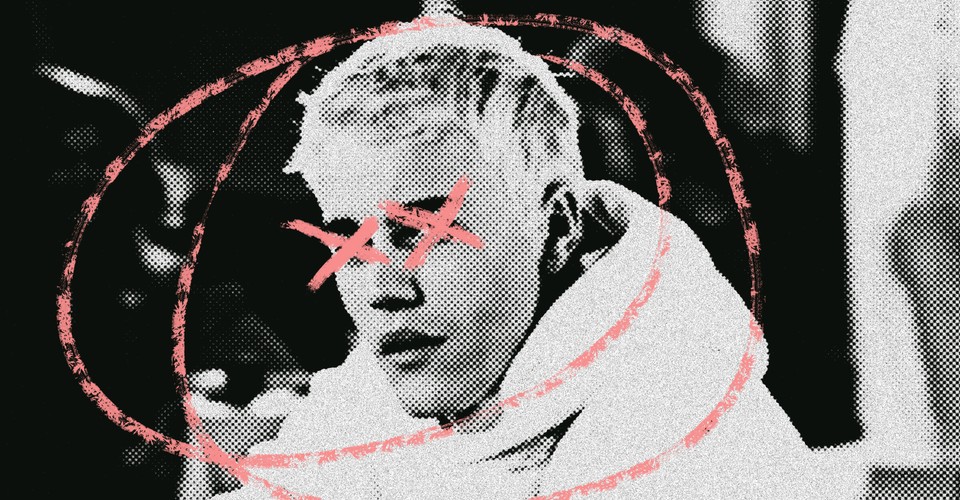Celebrity Gossip Has a QAnon Problem

Gossiping about celebrities is fun because you don’t know them personally and therefore you can’t hurt their feelings or directly ruin their lives. The idea that celebrity gossip could ever be dangerous is silly. For example, let’s say I told the woman who cuts my hair (whom I am always trying to entertain) that Jay-Z supposedly threatened to have Chris Brown murdered because Chris Brown keeps claiming to be part of the Illuminati, and Jay-Z is often associated with the Illuminati, and also Jay-Z doesn’t want anyone to think that he would ever hang out with Chris Brown even if they were both in the same, centuries-old secret society, which they’re not. No one on the planet could possibly be harmed by this hypothetical exchange with the woman who cuts my hair. It’s just very funny!
Or maybe that’s no longer true. Maybe celebrity gossip has a different character now, amid ceaseless worries over disinformation and conspiracist thinking. We’re experiencing an epistemological crisis, smart people keep telling me, so you have to wonder whether the habit of passing around possibly made-up information about famous people and their secret lives is contributing to whatever that precisely is. Reading and sharing gossip used to be a mindless escape. Now it seems to come with responsibility.
Earlier this month, BuzzFeed News’s Katie Notopoulos reported on concerns among longtime fans of the anonymous, omniscient-seeming blogger Enty, who runs a popular blind-item blog called Crazy Days and Nights. Some have apparently been disturbed by the site’s recent, gossipy posts about Bill Gates, and by others alleging that Hollywood stars are participating in a “rape club.” “It’s really disturbing to see this right-wing conspiracy-theory bullshit show up in gossip,” one former fan told Notopoulos. But according to the story, “gossip fans and QAnoners share a core belief: that behind closed doors, celebrities are doing unspeakable things.”
The idea that Enty has been pulled into the QAnon conspiracy theory had been floating around for a while. (Pajiba’s Kayleigh Donaldson referred to his site as “QAnon Central” back in May.) Enty started writing in 2006, and many of his blind items have been lurid and impossible to prove; there is plenty of murder and Satanism, and he once had a three-part story about an A-list actor who would purchase huge pieces of fresh fish, then wrap them up and throw them out in public bathrooms. Enty has also shown an interest in some of the same famous people who fascinate QAnon devotees—for instance, the Swedish DJ Avicii, believed by conspiracy theorists to have been murdered because of his knowledge of a child-trafficking ring.
But this represents just a sliver of Enty’s offerings. He far more often writes up standard gossip, about cheating and drug use and embarrassing mishaps, and he has never endorsed the view that Democratic politicians and Hollywood celebrities are blood-drinking pedophiles who deserve to be executed. When I spoke with Enty recently, he suggested that readers may now simply see his style of celebrity gossip in a different light, given their cultural immersion in right-wing conspiracy theories. “I had been writing the same kind of stuff long before QAnon existed,” he said, “but now that QAnon exists, it seems like QAnon.” For example, he published blind items about the NXIVM cult, in which women were branded and referred to as slaves, long before its leaders were indicted for sex trafficking in 2018. “If I was to write that now, I think people would say, ‘Wow, he’s gone Q.’”
Enty described most of what he publishes as “stuff that tabloids wouldn’t do now but they would have done 10 years ago.” He noted an industry-wide shift that occurred when celebrities started using Instagram and other social platforms to snatch back power from paparazzi and reporters, leaving outlets such as Us Weekly and People to play nice and beg for crumbs of access. The tastes of younger audiences who grew up in the celebrity-gossip environment that followed can be manic and unpredictable. The beloved, crowd-sourced Instagram account DeuxMoi, which started posting early in the pandemic and now has more than 1 million followers, often flags “sightings” of celebs with no interesting context, or else posts items so bland that they must have come from publicists. Meanwhile, on TikTok, the red yarn is out of control: There was a whole season of combing Justin Bieber’s Instagram posts and music videos for clues as to his possible long-ago victimhood at the hands of a child-sex-trafficking ring; the platform is also home to the second coming of an old Tumblr conspiracy theory about a former member of the boy band One Direction, who is supposedly secretly married to another former member of that band, and also not the real father of his son, who could be a child actor but was once believed to be a plastic doll.
These things don’t feel so benign and silly as they might have at another time. For a while, I was following an Instagram account that was fixated on proving that Zayn Malik—yet another former member of One Direction—was not really the father of the model Gigi Hadid’s baby. During her pregnancy, commenters on that account said they hoped she would miscarry. I have also spent a lot of time on Tumblr reading about which actors’ wives are high priestesses in Satanic cults and whether a beloved actor owns a secret apartment on the Isle of Wight, which may or may not be overrun by Freemasons. It’s all absurd, but again, the comments hint at what it’s doing to some people’s worldview. When the indie musician Mitski was accused, without evidence, of keeping a child slave in her college dorm room, Tumblr users accused one another of being too cowardly to admit that Mitski deserved to be “canceled.” The whole thing circled around Tumblr for weeks as drama and entertainment, and Mitski was eventually pushed to make a statement denying the story.
Light-hearted celebrity gossip is still out there to be found. Personally, I look for it in email newsletters: Hunter Harris’s Hung Up, for example, indulges in obsessive questioning about topics such as the location of Martin Scorsese’s glasses, while Allie Jones’s Gossip Time elegantly catches famous people in obvious lies. Gossip can be productive, too, in that it provides a way of talking about the cultural significance of celebrities, questioning public-relations narratives, and passing along information that could be confirmed with a little reporting work. Tinfoil-hat gossipers are also sometimes correct. Britney Spears’s father once denounced the #FreeBritney crowd as conspiracy theorists, but when that drama came to its climax last winter, their vigilant note taking appeared prescient and compassionate—as opposed to the vicious and judgmental dishing about the same woman from years earlier, when so many people relished in her public disintegration.
Gossip isn’t ruined, exactly, but it is in a moment of moral panic: If a rumor mentions blood, then it must be QAnon! Certainly there’s too much gossipy speculation around—both the boring kind and the wild, scary kind—and too many people sharing it, many of whom have unclear motives. But readers of celebrity gossip have always had to differentiate between merely entertaining rumors and those that could spiral into harm (while sifting out the ones that are simply dull). Before QAnon, they had to do the mental work of drawing these distinctions for themselves, and they had to set their own standards for the information they passed along. Now it’s easier just to sort that information into buckets—bad or good, Q or not. That can lead to another form of paranoia, though: When you’re that afraid of seeing dangerous disinformation, you start to see it everywhere.

